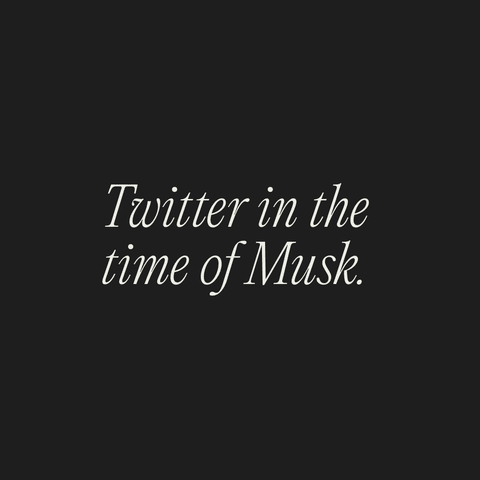NEWS ALERT - We won a SILVER IPM award for Best use of Social Media, 2025! Read more🏆

After months of back and forth, tweets, and possible legal actions, in October 2022, Elon Musk became the official owner of Twitter. What started as a mere tweet, and a joke to some, has now become one of the most talked about deals of 2022.
In the last few weeks, we have seen some big changes occur at the Twitter HQ. From dissolving the Twitter board, taking the company private and multiple layoffs and resignations, to tweeting out policies on the go, using Twitter polls to make decisions, and introducing Twitter Blue – many experts are now questioning Elon Musk’s role and ability.
His erratic management style and risk appetite are not foreign, however, running hardware driven companies like Tesla and SpaceX that have a larger picture in mind can be very different from running a social media platform where things change by the minute.
Musk may have stepped into the HQ with a sink, but his actions haven’t sunk in well with the Twitter employees. Firing some of the top management, along with many employees from product, sales, safety, and other departments has led to many employee lawsuits and concerns with FTC. Not only does it add to the acquired dept but firing people who best understand the platform might land Musk in trouble, especially with the festive season and world cup knocking on the door.
To create a new revenue stream, he announced the $8 subscription model, Twitter Blue, which lets people get verification check marks on their profile, along with receiving fewer and more targeted ads. It quickly backfired when a plethora of fake profiles emerged on Twitter, leaving many companies losing money. His struggle with free speech and profitability is further demonstrated by his contradicting comments on wanting Twitter to be a “town square and promoting free speech” versus not wanting it to turn into a “free-for-all-hellscape” and introducing a content moderation council. Such comments and tweets have left many top global advertisers to reduce or pause advertising on Twitter due to a lack of stability.
A flurry of rapid decisions by Elon Musk in the last few weeks shows his struggle to find a balance between making it a “free speech platform” and pushing the company toward profitability. His approach to Twitter currently feels hollow with many conflicting ideas and no clear plan of execution. Elon has said that the verification check marks for everyone will help to clear the platform of the bots, but it has raised questions such as – if everyone is verified, does it mean no one is? His comeback of adding “official” under some profiles, ultimately is taking it back to where it started, with $8 extra dollars in Musk’s pocket for every verification check. Moreover, running polls to make strategic decisions on a “bot-filled” platform seems borderline dangerous.
Many questions remain unanswered with Elon Musk’s quest to build Twitter 2.0. There is no doubt that Twitter was not at its best before being bought; however, is it possible for him to replicate the success of Tesla and SpaceX with Twitter? Will his first-doom-then-groom strategy also work for Twitter? Is it the death of Twitter, or is it Musk’s extensive plan to demolish the platform, just to create his very own?
As of now, it seems like Mr. Musk is in pursuit to build a platform that reflects himself, which is managed poorly with a confused vision. With more and more employees resigning by the minute and a lack of knowledge about the safety and management of the platform, it seems like Musk has a very big crisis in front of him to make sense of his $44Bn investment.